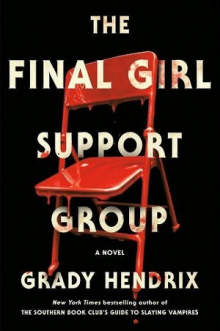
Any fan of horror movies knows what the term “final girl” means. A final girl is the person left standing at the end of a horror movie. During the course of the film, she evades the threat, usually losing several friends and family members in the process, long enough to have a lethal confrontation that results in the killer’s death (who regularly defies all reason by returning in the sequel). Final girls rarely appear consecutively in these films and are regularly replaced by new characters in subsequent installments, because the main focus for the films, and their franchises, is on the killer and not on the victims.
In his book, The Final Girl Support Group, Grady Hendrix gathers the “final girls” from cinema’s most famous slasher franchises to meet for secret monthly group therapy sessions. In these sessions, the women share, confide, challenge, and grieve with the only other people who understand what living through this type of experience is like and the toll that it takes.
When they find out that Adrienne, a member they believe is simply late to, or skipping, a session has been killed, they scatter and attempt to find safety and solace in their own unique ways. But it soon becomes clear that the threat is bigger than just one person and that they are all targets now. Only if they work together will they be able to survive, again.
In The Final Girl Support Group, Grady Hendrix does for films like Friday the 13th, Nightmare on Elm Street, and Halloween what Stephen Sondheim did for fairy tales with Into the Woods. He shifts the focus and takes the action off the screen, telling readers what may happen when the nightmare is over and the “final girl” has to struggle to pick up the pieces of her shattered existence. He moves beyond the last page, or frame, and shows the struggle of moving past and surviving Hendrix’s equivalents of Jason, Freddy and Michael Meyers, while continuously poking fun at the source material.
Hendrix creates memorable characters out of their one dimensional film progenitors thrusting them into, and keeping them in, the spotlight. Make no mistake, this book is about the survivors, not the perpetrators. And while there is violence in the book, it isn’t glorified nor dwelt upon. Hendrix also asks readers to wonder why slasher films have over the last four decades become such an entertainment juggernaut and what it says about the culture that revels in senseless, mindless, representations of pointless death.
With breakneck action, an ever present sense of foreboding, and a wicked sense of humor, Hendrix utilizes, skewers, subverts, and lampoons every trope in the slasher film library. The Final Girls Support Group is a humorous, horrifying, page-turner!